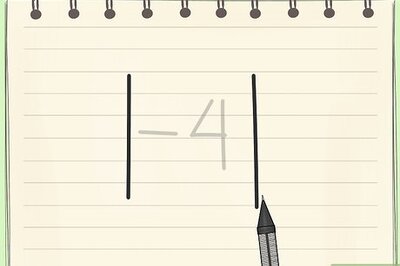
views
Dhaka: Ahead of Prime Minister Manmohan Singh's September 6-7 visit in Dhaka, Bangladesh on Sunday said it preferred a framework agreement on transit between the two sides instead of a revised Indian proposal for inking a protocol on using this country's two seaports.
"Bangladesh has prepared a draft on a framework agreement on transit which is likely to be presented for discussion during the meeting of our Prime Minister Sheikh Hasina and India's Dr Manmohan Singh," a senior official familiar with the process told preferring anonymity.
He said that the agreement could be signed if the two Prime Ministers agreed to it.
His comments came a day after the unscheduled visit of National Security Adviser Shivshankar Menon in Dhaka, his second such trip in five days, to review the last-minute preparations ahead of Singh's September 6-7 tour.
Mass circulated 'Prothom Alo' newspaper reported on Sunday quoting a "responsible source" that New Delhi last week sent a revised draft of a protocol seeking to use Bangladesh's southeastern Chittagong and southwestern Mongla ports.
The source said Dhaka was unwilling to sign the protocol as the issues of transit routes and fees were yet to be settled while the ministries of Foreign Affairs, Commerce and Communication and the Tariff Commission and Revenue Board earlier opposed the idea due to lack of preparedness.
"Due to practical reasons we need to sign a broad framework agreement first ahead of protocols detailing the nitty-gritty issues," Tariff Commission Chairman Mojibur Rahman, who was tasked to lead a committee to suggest transit fees, earlier told newsmen.
According to another official familiar with the proposals, the commission said Bangladesh's main seaport of Chittagong, however, was largely ready to let the facility be used for the transit but the transport mechanisms and routes were yet to be readied and fees yet to be settled for the arrangement.
But, he said, the commission identified 15 routes as suggested in the Indian proposal for the transit for carrying goods to and from the two seaports while it submitted its report to the government proposing 7 cents for road ways, 3 cents for railways and 2.5 cents for waterways as "minimum" proposed transit fees.
Finance Minister AMA Muhith, however, earlier said Bangladesh and India could reach an agreement on the complicated transit fee issue during Singh's crucial Dhaka visit.
Prime Minister Sheikh Hasina's Foreign Affairs Adviser Gawher Rizvi, meanwhile, said Bangladesh intended to offer first the expanded transit facilities through water routes and then the preference would be given to the railway system.
"We can offer the transit facility to India only after developing our road infrastructures," he said.
On Menon's visit last evening, official sources said he was in Dhaka for a few hours to review the latest developments linked to Singh's September 6-7 tour.
"Mr Menon held meetings with Water Resources Minister Ramesh Sen and Prime Minister Sheikh Hasina's Foreign Affairs Adviser Gawher Rizvi and Economic Affairs Adviser Mashiur Rahman," a source told without elaborating.
The transit issue has raised fresh debates among experts and independent think tanks as the government here said the arrangements for the bilateral connectivity was outlined in a 1972 treaty between the two countries.
Bangladesh and India had a 25-year Treaty of Friendship, Cooperation and Peace signed on March 19, 1972, but the two governments declined to renegotiate or renew the treaty when it approached expiry in 1997.
Leading independent think tank and connectivity specialist Debapriya Bhattacharya told that from political point of view Bangladesh currently witnessed little "anti-Indian sentiment" compared to the past and the political leadership also strongly reflected their goodwill for transit.
"But the government must not frustrate the favourable situation through reaching an imprudent agreement bypassing or without exhausting the standard operating procedure," he said.
Transit through Bangladesh, for India in particular, remained a contentious issue as main opposition BNP and its rightwing allies were opposed to the facility for "security and economic concerns," an argument rejected by mainstream financial and security analysts.
Of late, BNP, however, apparently softened its stance, saying they were not opposed to the connectivity if it did not compromise the country's interest but all transit-related deals have to be made public and discussed in Parliament.
"We welcome the Indian Prime Minister's visit and expect it to resolve the outstanding bilateral issues including water sharing in common rivers.
"But we will not accept any agreement if it goes against the country's interest the government is yet to outline the proposed agreements in Parliament raising our concerns," BNP Secretary General Fakhrul Islam Alamgir told a party
function last night.

















Comments
0 comment